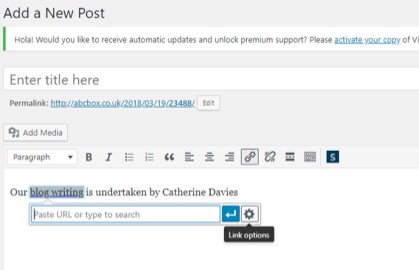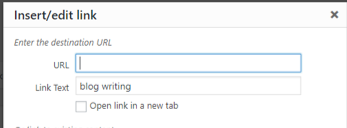5 Tips for Blog Writing in 2020
In my previous blog, I discussed why written content continues to play an important role in online marketing. With that in mind, here are some ideas to get you thinking about potential blog articles.
How to Add Value through Blog Writing
Writing a business blog should focus on building the trust of your audience. You are an expert in your field, so let’s put that to good use. The best content is that which is of interest and value to your customers and below are five blog writing suggestions:
Provide Answers to FAQs
What are the questions that you are frequently asked? Answer these with clear, plain English explanations.
Write Blogs that Develop Knowledge and Understanding
Can you help potential customers to better understand your products or services? Think product comparisons, examples of industrial applications, assembly instructions or serving suggestions.
Showcase your Problem-solving Abilities
What problems do your customers face? Your advice could help them to resolve simple challenges. A top tip to help eliminate a common frustration is a great way to be seen in a favourable light.
Share your Commitment to Delivering the Best Service
Are you working towards a particular goal or accreditation (quality, sustainability, customer service etc)? If so, let your customers know, along with what this will mean for them. You can then post again when you achieve that outcome.
Respond to Topical News
If a breaking media story relates to your business, use it as an opportunity to explain, reassure and offer advice.
These are a few ways in which you can prove your authority and expertise, whilst providing written content that is of value to your readers.
Is it Worth Hiring a Freelance Copywriter?
If this all sounds great, but you never find the time, it could be worth hiring a freelance copywriter.
Remember, that strong blog content is one factor helping your business to remain competitive. Yes, you can write, but are you the best person for the job? I am sure you can also kick a football, but would you be the best person to get signed up for your team?
An experienced copywriter can see your services from a fresh perspective. They will tailor your message in a way that appeals to prospective customers and search engines.
Take time to discuss your objectives and your target audience with the freelance copywriter. They can then create a content plan for you to agree. You can then focus your attention on other demands, simply reviewing, approving and posting the articles as they are written.
Blog writing is a straightforward task to delegate. According to HubSpot, 62% of companies with a blog outsource the task. Freelance copywriters typically produce articles on a monthly basis, or more frequently if you desire. You can opt to publish them on your website. Alternatively, if you trust them and provide Admin access to your website, the copywriter may offer to publish it.
In short, hiring a copywriter could be a cost-effective way to help build brand awareness. For further information, contact: catherine@write-it.co.uk













